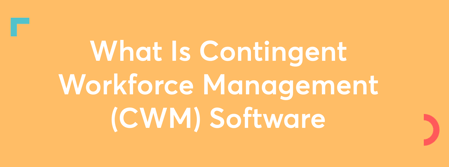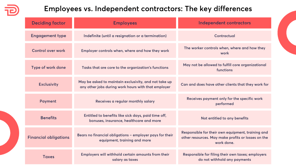What is a 1099 employee?
- 4 Oct 2023
- 9 mins read
- Posted in
Updated: 9th of July 2024
Content
- What is a 1099 employee?
- How do you classify a 1099 employee?
- What are the implications of misclassifying a 1099 employee?
- Explicit pros and cons of using 1099 workers
- Why do businesses use 1099 employees?
- What is the difference between a W-2 employee and a 1099 employee?
- How do you pay 1099 workers?
- What taxes does a 1099 employee pay?
Have you ever wondered "what does 1099 employee mean?" If your company has a hybrid workforce, chances are, you’re already working with 1099 employees. The challenge lies in correctly identifying who they are.
In a typical hybrid team, you may have your employees, freelancers, contractors, part-timers, remote workers, consultants and gig workers. All of these workers may be equally involved in your company’s operations, and hold varying positions of seniority. But only some of them will be classified under the ‘1099 employee’ category.
If the difference is not all that obvious, does the term you use to refer to them actually matter? The answer is yes! The 1099 worker classification is mandatory – and not just for your internal HR purposes. It changes everything, including what kind of taxes you have to pay, what documentation you have to maintain, what your legal obligations towards them are and more.
So, what is a 1099 employee? Who they are, what do they do, and do you have any on board?
What is a 1099 employee?
Fun fact – the term ‘1099 employee’ is actually misleading because these workers are not employees at all. The proper 1099 employee meaning is that they are independent contractors who work with your company rather than for your company. This means they are not a part of your permanent staff, they don’t fall within your company’s payroll, and they are not governed by the same rules and policies that your other employees are.
So, how does a 1099 work? And what is the 1099 employee meaning? Even though the 1099 role may be operating in much the same way as the rest of your staff, the following workers will be categorized as 1099 employees:
- Freelancers: This may get confusing because sometimes, your company may work with freelancers on a longer-term, ongoing basis. Think of any freelance social media managers, email marketing experts, IT managers or customer support experts on your team. Their contributions may be integral to the way your team functions, but they are 1099 workers just the same.
- Contractors: This includes any professionals you brought on board on a one-time, contractual basis. For example, the web developer who worked on your company website or the PR expert who was brought in ahead of that big product launch. But it also includes any longer-term contractors you have.
- Consultants: This refers to external professionals who consult with your company to offer their expertise. Think of the accountants who may be helping your company file taxes each year or the legal experts who are brought in as needed. Many directors and senior executives often bring in their expertise as consultants too.
- Gig workers: Gig work holds opportunities across a variety of professions – like editors, those offering transcription services, translators, delivery personnel, traveling nurses, healthcare experts, maintenance staff and more. If your company engages any of these workers, they’ll all fall under the 1099 category.
How do you classify a 1099 employee?
So what’s the difference between an independent contractor and an employee? In a modern workplace that has remote and flexible work policies, this difference is not obvious at all. But as per the Fair Labor Standards Act (FLSA), the IRS offers a 3-pronged approach to classify them correctly. These are called the Common Law Rules and they involve:
- Behavioral parameters
A 1099 employee must retain complete control over how they work. As an employer, you can just demand certain results by a specific deadline – but how they work to meet those targets should be left up to them. They should be able to decide where they’ll work from, what timings they’ll follow, and what work methodologies they’ll establish.
In contrast, you have the right to set these parameters for your employees – even if you do choose to allow them certain flexibilities. - Financial conditions
1099 workers set their own rates – be it on an hourly or a per-project basis. Unlike an employee who earns a consistent salary, the amount these workers earn every month may fluctuate greatly.
But another major point of difference is this – your employees will never bear any financial obligations or out-of-pocket costs to work for you. You’ll be required to reimburse any expenses they incur while on the job, pay for all their equipment and training, and pay overtime if they operate outside of work hours.
1099 workers have to bear all these expenses themselves. They need to arrange for their own equipment, licenses, certifications and anything else they need to do the job you’ve engaged them for. Any transport, meals or other expenses they incur are on them. And since you as an employer cannot set the work timings for a 1099 worker, there’s no question of paying them overtime. These professionals will usually account for all these costs when they quote their rates to you. - Type of relationship
Your relationship with 1099 employees is purely contractual. Once the work is delivered as agreed and the contract is over, neither party is obliged to keep working with each other. Should you wish to continue working with them even after this, you will need to draw up a new contract where the terms of engagement or retainership will be clearly specified.
Your relationship with an employee is more permanent – and you are obliged to continue paying them every month until either you terminate their services on valid grounds or the employee resigns
Explicit pros and cons for using 1099 workers
Using 1099 workers offers several pros and cons for businesses. Understanding these can help in making informed decisions about workforce management. While using 1099 workers offers flexibility and cost savings, it also brings challenges in terms of control and commitment. Businesses should weigh these factors carefully based on their specific needs and circumstances.
Pros
- Flexibility
Hiring 1099 workers allows businesses to adjust more easily to workload fluctuations. They can hire contractors for specific projects or during peak periods without the long-term commitment required for full-time employees. - Cost Savings
Employers save on various costs like health benefits, payroll taxes, and other employee-related expenses. This can significantly reduce the overall labor costs. It’s also more cost-effective to pay for skills on-demand. - Specialized Skills
Independent contractors often possess specific skills or expertise that might not be present in the existing workforce. This can be particularly beneficial for short-term projects requiring specialized knowledge. - Reduced Legal Liabilities
In many cases, employers have fewer legal obligations towards 1099 workers compared to W-2 employees, which can reduce the risk of legal issues related to employment. - Less Administrative Burden
With 1099 workers, the administrative load is typically lighter. There's no need to manage payroll taxes, unemployment insurance, or workers' compensation for these workers.
Cons
- Less Control
Employers have less control over 1099 workers compared to traditional employees. They can dictate the outcome of the work but not how the work is done, which may affect consistency and quality. - Short-term Commitment
Since 1099 workers are not bound by the same commitments as employees, they may leave for other opportunities with little notice, potentially disrupting ongoing projects. - Training and Integration Challenges
Independent contractors might not be as integrated into the company culture or processes, which can create challenges in team dynamics and collaboration. - Legal Risks
Misclassification of employees as 1099 workers can lead to legal and financial repercussions. It's crucial to understand and comply with the legal distinctions between contractors and employees. - No Long-Term Loyalty
Contractors may not develop the same sense of loyalty or commitment to a company as full-time employees, which might affect long-term business growth and internal knowledge retention.
Why do businesses use 1099 employees?
Businesses often turn to 1099 employees as a strategic workforce solution due to the numerous advantages they offer.
- Access to a Wider Talent Pool
Independent contractors can be sourced globally, allowing businesses to tap into a broader talent pool. This is particularly useful for specialized or niche skills that might not be readily available locally. - Quick Deployment
Hiring a full-time employee often involves a lengthy recruitment and onboarding process. In contrast, 1099 workers can usually start work more quickly, which is advantageous for projects with tight deadlines. - Reduced Office Space and Resources
Since many independent contractors work remotely or use their own office space and resources, businesses can save on the costs associated with physical office space, utilities, and office supplies. - Experimentation and Innovation
Independent contractors can bring fresh perspectives and new ideas. This external insight can be valuable for innovation, especially in creative, technical, or strategic projects. - Reducing Risk of Staff Turnover
By using contractors, businesses can avoid the costs and disruptions associated with staff turnover. Contractors are typically engaged for a specific task or period, and their departure at the end of the contract is an expected part of the process. - Enhanced Scalability and Agility
In fast-paced industries, the ability to quickly scale operations up or down is crucial. Utilizing independent contractors allows businesses to be more agile in responding to market demands without the burden of hiring or laying off full-time staff.
What are the implications of misclassifying a 1099 employee?
A misclassification occurs when an employer oversteps the boundaries set by the Common Law Rules. It essentially means that they are treating the 1099 contractor as an employee and enjoying all the advantages associated with that – without fulfilling any of the obligations involved. The consequences of this can be severe indeed.
- You may be pulled up for wage law violations.
Under the labor laws, employees are eligible for certain assurances like minimum wages and overtime pay – all of which a misclassified 1099 worker will now have claim to. You may be required to pay the difference in wages, overtime and more, alongside massive fines. If the violation is found to be willful, it may even mean criminal penalties. - You may be held liable for missed benefits.
Aside from wage assurances, employees are also entitled to other benefits like vacation days, paid sick days, insurance, retirement coverage and more. A misclassification ruling may mean that you now have to pay financial compensation to the workers in question. This can add up to a hefty amount with back payments and fines. - You may face employment tax penalties.
As an employer, you are required to withhold and pay taxes from an employee’s wages. A misclassification would mean that you have failed to do this for workers who should rightly have been classified as employees. This is a serious offense – and may involve huge fines and penalties issued by state and federal bodies. - You may face I-9 violation penalties.
Authorities like Immigrations and Customs Enforcement, Department of Labor or Homeland Security require you to maintain records of all your employees for verification purposes. This is done through the Form I-9. Failure to have this record for misclassified contractors may put you at odds with federal departments and attract further penalties. - You may need to navigate reputational damage.
Perhaps not as tangible but just as severe as any penalty, is the damage to your organization’s reputation. Any company found to be engaging in classification malpractices may be blacklisted from applying for any government contracts. It may also throw up red flags for clients – both new and current – who may refuse to work with the company on ethical grounds. - You may experience poor team morale.
Following a scandal like this, companies usually go into a talent crisis, with employees getting demoralized and resigning to look for opportunities elsewhere. The damaged reputation makes it difficult to recruit new talent as well, be it 1099 workers or employees.
What is the difference between a W-2 employee and a 1099 employee?
While a 1099 employee is an independent contractor, a W-2 employee refers to the employees on your company’s payroll.
As discussed above, every payroll employee has certain rights that they are entitled to, while affording you a greater degree of control over how they work. You are legally obliged to offer them wage assurances, overtime, benefits and more. At the same time, you get to set their timings, decide where and how they’ll work, and dictate what they’ll work on.
Just like with contractors, the term ‘W-2 employee’ comes from the tax form you need to file for each of these workers. In this case, however, you as the employer will need to withhold the taxes that are due on their wages. Read this blog for a deeper understanding of the differences between a W-2 employee and a 1099 worker.
How do you pay 1099 workers?
1099 employees determine their rates through various methods, such as hourly, per-project, or monthly retainers for ongoing assignments. It's crucial to choose a mutually beneficial payment method and clearly specify it in the contract.
Managing payments for 1099 workers is complex due to inconsistent invoice amounts, varied payment schedules, and different payment methods. Additionally, working with international contractors can be costly due to currency exchanges. Businesses often face high FX exchange rates, bank fees, and hidden charges, increasing overall expenses. For freelancers, receiving payments in different currencies can also be expensive due to similar conversion costs and fees.
Using a payment portal can alleviate these challenges. Such platforms consolidate invoices, streamline global payments in various currencies, and allow setting up multiple entities for international operations. They offer budget tracking, simplify reporting and audits, and assist in 1099 filings. By organizing payment information, these systems help avoid penalties associated with delayed filings. While TalentDesk is an example, there are other similar solutions that offer these services, reducing the financial burden of currency conversions for both businesses and freelancers.
What taxes does a 1099 employee pay?
Your responsibilities as an employer requires you to ensure you have the correct personal information and Taxpayer Identification Number (TIN) for each contractor on file. Collecting Form W-9 during the onboarding process makes sure you have all the necessary information.
If you make payments of over $600 to a contractor in a single year, you will need to file a Form 1099-NEC for them by the given deadline. You will then need to send a copy of this to the IRS as well as to the relevant worker. That’s where your tax obligations towards 1099 employees end.
Beyond this, these workers are responsible for paying their own taxes. The self-employment tax in the US covers Social Security payments as well as Medicare. Usually, this comes up to a maximum of 15.3%. However, some additional state taxes and local taxes may be applicable, depending on where the freelancer or contractor is based.
As you may have realized, having 1099 workers on your team can be a huge advantage. They work largely independently – they are equipped to jump on board your projects and hit the ground running, delivering high-quality results with minimum involvement from you. What’s more – since location is not a limiting factor here, you have the option to hire top professionals from around the world on a freelance or contractual basis. As long as you have your 1099 management processes in place, you are ready to reap the rewards of a truly hybrid workforce and make use of the 1099 role!

Sanhita Mukherjee
Find out how TalentDesk can help you manage and pay your 1099 employees.
Related articles
What is a Vendor Management System (VMS)? A Complete Guide
What is a Vendor Management System (VMS)? A Complete Guide
Discover what a Vendor Management System (VMS) is and why it’s essential for managing your workforce. Streamline vendor management with ease.
Best Contractor Management Software for 2025
Best Contractor Management Software for 2025
Discover the best contractor management software to streamline workflows, ensure compliance, and simplify payments. Manage global contractors with ease.

What is a Contractor Of Record (COR)?
Discover the role of a Contractor of Record (COR) – Learn how a COR streamlines contractor compliance and safeguards your business legally.

California’s Freelance Worker Protection Act: What Businesses Need to Know
Learn how California’s Freelance Worker Protection Act (FWPA) impacts your business with compliance requirements, payment rules, and penalties.

Mastering Influencer Management: Strategies for Effective Collaboration
Our guide to influencer management, exploring strategies, tools, and tips to create successful influencer relationships and enhance your marketing impact.

10 Reasons Why You Don’t Need a Contractor Management System
Discover 10 hilarious reasons why you absolutely don’t need a contractor management system - because who needs efficiency, happy freelancers, or sleep?

What Is Contingent Workforce Management Software?
Discover how contingent workforce management software enhances cost savings & access to talent. Learn about essential tools, compliance & best practices.

The Hidden Complexities of Independent Contractor Classification
Read the complexities of independent contractor classification in our guide. Stay ahead with expert insights into evolving rules, tools, and future trends.

Deel vs. the Competition: Discover the Best HR Software Alternatives
Discover the best Deel alternatives for global HR management. Compare features, pricing, and reviews to find the best solution for your global workforce.
The Ultimate Guide to External Game Development
The Ultimate Guide to External Video Game Development
Explore our ultimate guide on external game development, covering crucial strategies, tools, and tips to manage freelance developers efficiently.

